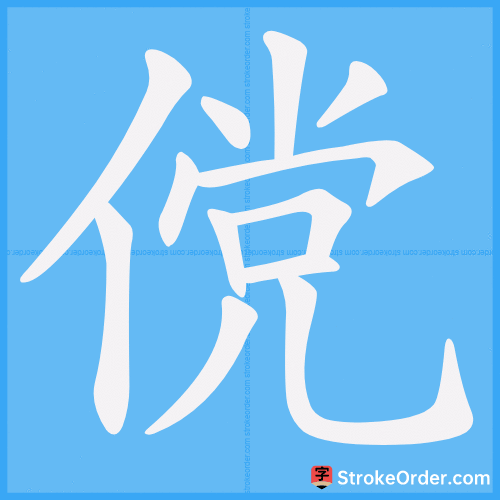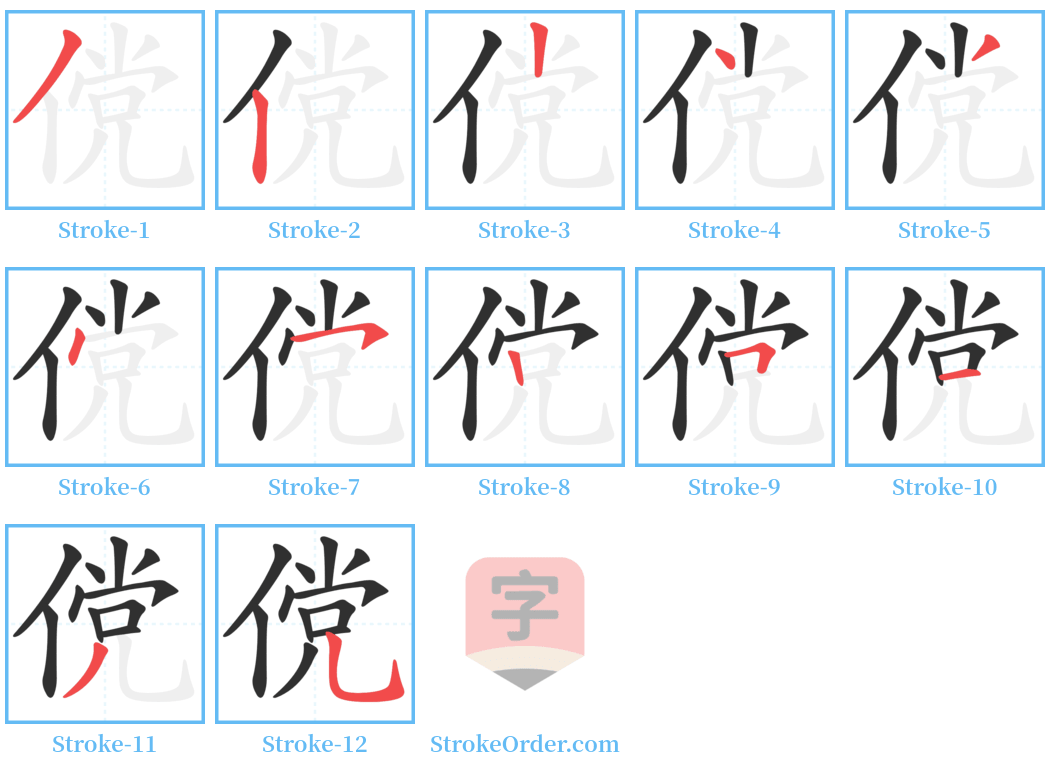傥 Stroke Order
Animated Stroke Order of 傥

Stroke Order Diagrams for 傥

Step-by-Step Handwriting Guide for 傥

Learn to Write Chinese Characters with Video Tutorials
Watch the video of writing the Chinese character "傥", learn the correct stroke order (笔顺) of the character "傥", and master the standard way of writing the character "傥".
Free Printable Handwriting Practice with Stroke Order: 傥
Printable Writing Practice Worksheet of "傥" in Portrait Orientation (Tian Zi Ge)

Printable Writing Practice Worksheet of "傥" in Landscape Orientation (Tian Zi Ge)

Information of 傥
Pinyin
tǎng
Radical
亻
Strokes
12 strokes
Usage
★★★★
Definition
if / unexpectedly
傥 (tǎng)
1. 同“倘”([En.]: the same as "if" or "suppose").
2. 〔倜~〕见“倜”([En.]: refer to "倜").
3. 失意([En.]: disheartened): “文侯傥然,终日不言”([En.]: "The Duke was disheartened and did not speak all day.")
傥 (tǎng)
1. 形 (形容词)([En.]: adjective)
- 本义: 洒脱不拘,不拘于俗([En.]: The original meaning: unconventional and unrestrained)
- 造字法: 形声。从人,党声([En.]: Phonetic and semantic compounding; composed of 'person' and phonetic '党').
- 义项:
1. 同本义([En.]: unconventional)
- 引: 《汉书·傅常郑甘陈段传》:赞陈汤傥荡。注:“无行检也。”([En.]: "In the Book of Han, it praises that Chen Tang is unconstrained.")
- 例: 又如:倜傥(洒脱;不拘束)([En.]: For example, 倜傥 means unconstrained and free-spirited.)
2. 怅然自失,恍惚([En.]: absentminded)
- 引: 《庄子·田子方》:文候傥然,终日不言。([En.]: "In Zhuangzi, the Duke was absentminded and did not speak all day.")
- 例: 又如:傥然(失志的样子);傥莽(怅然自失)([En.]: For example, 傥然 means looking disheartened; 傥莽 indicates absentmindedness.)
3. 正直([En.]: upright)
- 例: 如:傥言(正直的言论);傥论(堂皇正大的言论)([En.]: For example, 傥言 means upright speech; 傥论 indicates glorious and righteous discourse.)
4. 广大([En.]: broad)
- 例: 如:傥漭(广阔无边);傥阆(广大宽敞);倘莽(旷远);傥朗(晦暗不明的样子)([En.]: For example, 傥漭 means vast and boundless; 傥阆 indicates large and spacious.)
5. 安闲自得([En.]: leisurely)
- 例: 如:傥佯(安闲自得地行走);傥傥(舒闲自适地)([En.]: For example, 傥佯 means walking leisurely; 傥傥 indicates a relaxed state of being.)
2. 连 (连词)([En.]: conjunction)
- 表示假设,相当于“倘若”、“如果”([En.]: Indicates a hypothesis, equivalent to "if")
- 引: 《史记·伯夷传》:傥所谓天道,是邪?非邪?([En.]: "In the Records of the Grand Historian, it asks if the so-called Heavenly Way is right or wrong.")
- 例: 又如:傥若;傥使([En.]: For example, 傥若 means if; 傥使 indicates if used.)
3. 副 (副词)([En.]: adverb)
- 偶然,意外地([En.]: by accident)
- 引: 欧阳修《新唐书》:况荣宠贵盛,傥来物也,可恃以凌人乎。([En.]: "In Ouyang Xiu's New Book of Tang, it mentions that one's prestige might come unexpectedly as a means to overpower others.")
- 例: 又如:傥来(意外得来);傥然(偶然;侥幸)([En.]: For example, 傥来 means coming unexpectedly; 傥然 indicates by chance or fortuitously.)
Input Method for 傥
Pinyin
tang3
Wubi
wipq
Cangjie
ofbu
Zhengma
nkjr
Four Corner
29212
Unicode
U+50a5
Same Pronunciation Characters